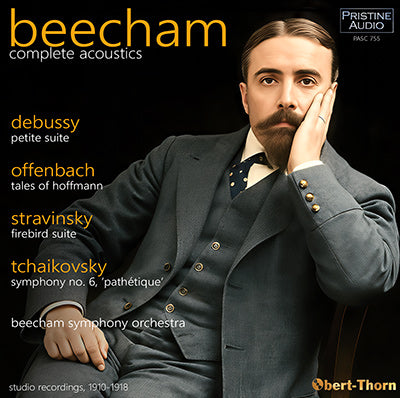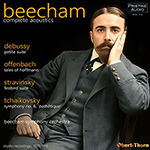
This album is included in the following sets:
This set contains the following albums:
- Producer's Note
- Full Track Listing
- Cover Art
This release brings together all of the acoustic recordings of Sir Thomas Beecham, which were omitted from the Warner Classics Beecham “Mono Era” CD box. They shed an invaluable light on the conductor’s activities in London during the 1910s, and feature 16 works that Beecham never re-recorded during his long career. They are presented here in matrix number order, based on the discography published by Michael Gray in 1979 for the conductor’s centenary.
When the 31-year-old Beecham entered the Gramophone Company’s London studios in July, 1910, he had already been conducting for eleven years, most recently with the ensemble he had founded the previous year, the Beecham Symphony Orchestra, whose ranks included such future luminaries as Albert Sammons, Lionel Tertis and Eric Coates. That summer, he was heavily involved with operatic productions held at His Majesty’s Theatre featuring his own Beecham Opera Company. Both Tales of Hoffmann and Die Fledermaus were given during this season.
Another session held a month later produced a recording whose attribution is somewhat controversial. On 31 August, a symphonic band recorded several titles for the Gramophone Company. Their matrix book identified the ensemble as the Black Diamonds Band, a group which recorded prolifically for the label, making recordings “for the Berlin branch”. They were released in Germany credited to the “Grammophon-Orchester”, which Gray described as “an all-purpose name used for orchestral recordings made outside Germany.”
One of the titles, however - a potpourri of tunes from Eugen d’Albert’s opera, Tiefland - was released in England credited to the Beecham Symphony Orchestra. Because Beecham was at the time preparing for the British première of the opera at Covent Garden, the attribution was accepted in Gray’s discography and reflected in some reissues of his early recordings. However, because several of the other titles made at the session were of non-Classical repertoire that Beecham would not have conducted, it seems likely that this was a misattribution by the Gramophone Company, perhaps an intentional one to link the record with Beecham’s production. (A similar potpourri from Verdi’s Nabucco, recorded directly after the Tiefland sides but credited only to the Grammophon-Orchester, is included in the download version of this release.)
The next group of recordings was made around two years later for the Odeon label, whose recordings were as crude sounding as their pressings were noisy, but whose rarity make them highly sought after by collectors. One can hear the increasingly tight ensemble work of Beecham’s orchestra, far above the average level of playing for London orchestras of the time, in such works as the William Tell Overture.
In 1915, Beecham signed with Columbia, the label for which he would make most of his recordings for the next couple decades. In contrast with other labels, Columbia for the most part did not reorchestrate to make recordings “register” more impactfully using the acoustic process. Timpani are clearly heard in the “Polovtsian Dances”, and double basses in the Bartered Bride Overture are discernable, if just barely. However, the bass drum is omitted from the Damnation of Faust’s “Hungarian March”.
Additionally, Columbia allowed relatively complete recordings of some overtures to be made. Beecham’s first Columbia disc, the Magic Flute Overture, is uncut; and their Oberon Overture, despite some internal cuts, was still allotted two sides. (The Roman Carnival Overture was apparently recorded complete as well, but only the second side was issued.)
These recordings again reflect some of Beecham’s recent productions. The conductor had given the British première of Der Rosenkavalier in 1913; but the selection of waltzes heard on the Columbia disc is not the familiar Otto Singer arrangement. That same year, Beecham produced a series of Russian ballets at the Drury Lane Theatre featuring Nijinsky among others. The excerpts from the first version of the Firebird Suite made three years later appear to be the earliest recording of any Stravinsky work, as well as Beecham’s only representation of the composer on disc.
Mark Obert-Thorn
BEECHAM The Complete Acoustics
CD 1 (78:46)
GRAMOPHONE COMPANY RECORDINGS (1910)
OFFENBACH Tales of Hoffmann
1. The Doll’s Song (3:12)
Caroline Hatchard (soprano) and Beecham Opera Chorus
Recorded 27 July 1910 ∙ Matrix: 4340f ∙ First issued on Gramophone
Concert Record 03193
2. Legend of Kleinsack (3:53)
Walter Hyde (tenor)
Recorded 27 July 1910 ∙ Matrix: 4341f ∙ First issued on Gramophone
Concert Record 02256
3. Drig, drig, drig (2:50)
Beecham Opera Chorus
Recorded 27 July 1910 ∙ Matrix: 4347f ∙ First issued on Gramophone
Concert Record 04505
4. When love is but tender and sweet (2:34)
Walter Hyde (tenor) and Beecham Opera Chorus
Recorded 28 July 1910 ∙ Matrix: 4353f ∙ First issued on Gramophone
Concert Record 02257
5. J. STRAUSS II Die Fledermaus - Overture* (3:51)
Recorded 28 July 1910 ∙ Matrix: 4360f (later 381 ac) ∙ First issued on
Gramophone Concert Record 0627
6. D’ALBERT Tiefland - Selections** (8:09)
Recorded 31 August 1910 ∙ Matrices: 4423/4f ∙ First issued on Gramophone
Concert Record 0629/30
ODEON RECORDINGS (c.1912)
7. ROSSINI William Tell Overture - March (2:59)
Recorded c.1912 ∙ Matrix: Lxg 30 ∙ First issued on Odeon 0795
8. MISSA Muguette - Entr’acte** (3:13)
Recorded c.1912 ∙ Matrix: Lxg 39 ∙ First issued on Odeon 0795
9. MASCAGNI Cavalleria Rusticana -
Intermezzo* (3:02)
Recorded c.1912 ∙ Matrix: Lxg 40 ∙ First issued on Odeon 0772
10.
MENDELSSOHN The Bees’ Wedding (Songs Without Words, No. 34)*
(1:46)
Recorded c.1912 ∙ Matrix: Lxg 41 ∙ First issued on Odeon 0772
11.
MOZART Le Nozze di Figaro, K.492-Overture
(3:33)
Recorded c.1912 ∙ Matrix: Lxx 3677 ∙ First issued on Odeon X-84
12. WEBER Oberon Overture(3:58)
Recorded c.1912 ∙ Matrix: Lxx 3678 ∙ First issued on Odeon X-84
COLUMBIA GRAPHOPHONE RECORDINGS (1915 - 1918)
13. MOZART Die Zauberflöte,
K.620-Overture (6:51)
Recorded 1915 ∙ Matrices: 6559-2 & 6560-2 ∙ First issued on Columbia
L 1001
14. BORODIN Prince Igor - Polovtsian Dances (6:46)
Recorded 1915 ∙ Matrices: 6561-2 & 6562-1
∙ First issued on Columbia L 1002
15. MASSENET Manon - Minuet* (2:33)
Recorded 1915 ∙ Matrix: 6563-1 ∙ First issued on Columbia L 1020
16. R. STRAUSS Der Rosenkavalier - Waltzes* (4:00)
Recorded 1915 ∙ Matrix: 6564-2 ∙ First issued on Columbia L 1020
17. BORODIN Prince Igor - Polovtsian March (4:04)
Recorded 1915 ∙ Matrix: 6601-1 ∙ First issued on Columbia L 1011
TCHAIKOVSKY Symphony No. 6 in B minor, Op. 74, “Pathétique”*
18. 2nd Mvt.: Allegro con grazia (3:57)
19. 3rd Mvt.: Allegro molto vivace (3:24)
Recorded 1915 ∙ Matrices: 6602-1 & 6603-1 ∙ First issued on Columbia
L 1016
RIMSKY-KORSAKOV Antar - Symphonic Suite, Op. 9
20. 3rd Mvt.: Allegro risoluto alla marcia (4:01)
Recorded 1915 ∙ Matrix: 6604-1 ∙ First issued on Columbia L 1011
CD 2
(73:49)
STRAVINSKY
The Firebird
-Suite (1911 Version) - excerpts**
1. Dance of the Firebird (1:07)
2. The Princess’ Game with Golden Apples (2:28)
3. Infernal Dance of All of Koschei’s Subjects (3:45)
Recorded c.May 1916 ∙ Matrices: 6797-1 & 6799-1 ∙ First issued on
Columbia L 1040
4.
MENDELSSOHN A Midsummer Night’s Dream,Op. 61 - Scherzo
(3:55)
Recorded c.May 1916 ∙ Matrix: 6800-2 ∙ First issued on Columbia L 1075
5. MOZART Divertimento in D major, K.131 - Minuet (3:51)
Recorded 1916 ∙ Matrix: 6904-1 ∙ First issued on Columbia L 1132
6. ROSSINI The Barber of Seville - Overture* (4:17)
Recorded 1916 ∙ Matrix: 6905-1 or -2 ∙ First issued on Columbia L 1075
7. BERLIOZ Roman Carnival Overture, Op. 9 (3:43)
Recorded 1916 ∙ Matrix: 6907-1 ∙ First issued on Columbia L 1105
8.
MOZART Le Nozze di Figaro, K.492-Overture
(4:02)
Recorded 1916 ∙ Matrix: 6908-2 ∙ First issued on Columbia L 1115
9. SIBELIUS Kuolema, Op. 44-Valse
triste (4:21)
Recorded 1916 ∙ Matrix: 6918-1 ∙ First issued on Columbia L 1162
10. SMETANA The Bartered Bride - Overture (4:06)
Recorded 1916 ∙ Matrix: 6919-2 ∙ First issued on Columbia L 1115
11. GRIEG Symphonic Dance No. 2, Op. 64 (4:14)
Recorded 1916 ∙ Matrix: 6920-2 ∙ First issued on Columbia L 1132
12. GOUNOD Romeo and Juliet - Processional
March* (3:04)
Recorded 1916 ∙ Matrix: 6921-2 ∙ First issued on Columbia L 1162
13. WEBER Oberon - Overture (8:01)
Recorded 1916 ∙ Matrices: 6922-1 and 6923-1 ∙ First issued on Columbia L
1104
14. BERLIOZ Damnation of Faust - Hungarian
March (4:05)
Recorded 1916 ∙ Matrix: 6924-1 ∙ First issued on Columbia L 1105
15. GERMAN (text: Kipling) Have you news of my boy
Jack?* (3:59)
Clara Butt (contralto)
Recorded c. February/March 1917 ∙ Matrix: 75414-2 ∙ First issued on
Columbia 7145
16. BIZET La Jolie Fille de Perth - Minuet* (3:44)
Recorded 1917 ∙ Matrix: 76036-1 ∙ First issued on Columbia L 1227
17. MOZART Le Nozze di Figaro, K.492 -
Fandango* (1:47)
18. LULLY Les Amants Magnifiques - Minuet** (2:16)
Recorded 1917 ∙ Matrix: 76037-2 ∙ First issued on Columbia L 1227
DEBUSSY (orch. Büsser) Petite Suite*
19. 1st Mvt. - En bateau (3:51)
20. 4th Mvt. - Ballet (3:04)
Recorded 15 August and 10 or 23 October 1918 ∙ Matrices: 76225-1 and
76226-2 ∙ First issued on Columbia L 1248
Download Only
21.VERDI Nabucco – Selections* (6:45)
Grammophon-Orchester (Black Diamonds Band or Beecham Symphony Orchestra)
Recorded 31 August 1910 ∙ Matrices: 4426/7f ∙ First issued on Gramophone
Concert Record 040653/4
Sir Thomas Beecham ∙ Beecham Symphony Orchestra
* = Only Beecham recording of the work
** = Only Beecham recording of any work by that composer
Producer and Audio Restoration Engineer: Mark Obert-Thorn
Special thanks to
Jolyon Hudson, Richard Kaplan, Dave Schmutz and the collection of the
late Don Tait for providing source material

